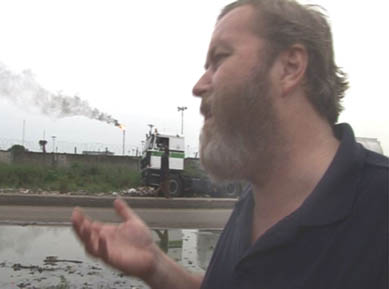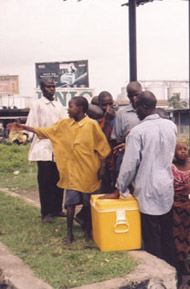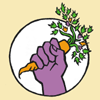

 Keith outside oil refinery |  Sharing food in Nigeria |
"Do we really need to travel to the Niger Delta?" four of our Nigerian activist companions lament. "It's dangerous. Expatriate oil workers are being evacuated from the region, but weÍre heading that way!"
After a heated debate, we decide to carry on as planned. Keith convinces the others that he's on a mission to feed the hungry and poor in Nigeria's troubled south, which will give us certain immunity should we stumble across any hostage takers.
All our fears are dispelled once we hit the road and pass a dozen or so police checkpoints without a hitch. Whilst other motorists are being frisked, bribed or beaten, we are given free passage as Keith jovially calls out "Food Not Bombs" and hands out some buttons.
The highway is lined with verdant palm plantations and we pass one of the world's great patches of mangrove forest. The countryside is brimming with greenery but the lush canopy conceals polluted soil and waterways.
It's smooth sailing most of the way, until we hit the Niger Delta region and run out of fuel. Every petrol station is either empty, closed or has queues that run for a couple of kilometres. Finally we manage to buy some oil from a black marketeer, avoiding queuing up for hours.
How is it that in Africa's biggest oil producing state, buying fuel can prove incredibly difficult? ItÍs part of what is called "the oil curse". Most of the oil is quickly guzzled out of the state into other parts of Nigeria and abroad, leaving little to nothing of the black gold to its inhabitants. When it comes to oil, it seems expediency is the rule.
At sunset we arrive in the southeastern city of Port Harcourt, the unofficial capital of Africa's biggest oil industry, and drive straight into a traffic jam, locally referred to as a "go-slow", except it's a complete gridlock. The driver turns off the engine to preserve our precious fuel supply.
I find myself mesmerised by the skyline that is lit up with an orange-glow of dancing oil flares, and excitedly jump out of the van to take some pictures. A foreigner from another vehicle, most likely an oil worker, calls out "Hey, you! What do you think you're doing? This is not Europe!" I look around and am suddenly surrounded by young men, street hawkers trying to sell me an assortment of goods that they carry on their heads, from rat poison to women's nightgowns to a game of scrabble. One street hawker shoves a holy picture of Jesus in my hand that reads "Fear Not. Even when you pass through the waters of life, they shall not overflow". Suddenly, fear starts to creep in and I feel like I'm drowning in the humidity and heavy fumes and cacophony of horns. I jump back into the van just in time, as the traffic starts to move.
We drive towards the light of the burning oil. In front of us, a series of oil tankers belch out black fumes. They pile into the oil refinery owned by the most powerful company in Nigeria, the Shell Petroleum Development Corporation, a local subsidiary of Royal/Dutch shell.
Just outside the multi-billion dollar oil refinery, an entire community live in absolute squalor and extreme poverty. It's always the case where localities surrounding oil installations are among the poorest, most environmentally damaged and conflict-ridden in the world.
We venture into the downtrodden village of debilitated old wooden shacks crammed together with narrow walkways filled with faeces and piles of rotting rubbish. Locals stand idly about seemingly oblivious to the stench and gawk at us as we search for the community leader. I feel like it's the first time they've seen white people and later discover we are indeed the first foreigners ever to visit. Yet just over the road, foreign oil companies siphon 2.5 million barrels of crude oil per day.
The elder of the community greets us and tells us about how life has progressively deteriorated since the oil companies came to their shores in the 60s. Over the years, they made many promises to the local communities about giving them a share of the oil wealth to help build schools and hospitals but nothing has ever materialised. Every week at least one-person dies from a sickness, he says, is a direct result of the foul pollution left from the oil refinery.
From the village, the constant glare of the oil flares tower above their cracking rooves. This village never sees the dark of night, as the oil burns 24 hours a day. At night, the locals huddle in their wooden huts away from the mosquito-infested swamps that surround them. Outside their doors, puddles of putrid water gurgles out of the ground like some psychedelic chemical goo that unleashes the foulest of odours.
I find myself tip-toeing down the narrow walkways afraid of trodding on something toxic as the elder takes us on a tour. He tells us of their endless woes - there is no health care, no school, no longer any arable land and therefore no food, no clean water, no clean air, nothing but the constant glare of the oil flares. It's the most tragic scene I have ever witnessed. This is oilÍs "paradox of plenty" and itÍs not a pretty picture.
As we leave, Keith hands the community a box of water and biscuits and I wonder how far the meagre supplies will last. He thanks them for not kidnapping him and promises to let the world know of their plight.
But the world already knows and pays little attention to the troubles of foreigners, especially Africans, unless they affect us directly. But perhaps now, with our oil prices spiralling out of control as trouble continues to brew in this oil-rich region, the world may be forced to see beyond the glare of the black gold.
